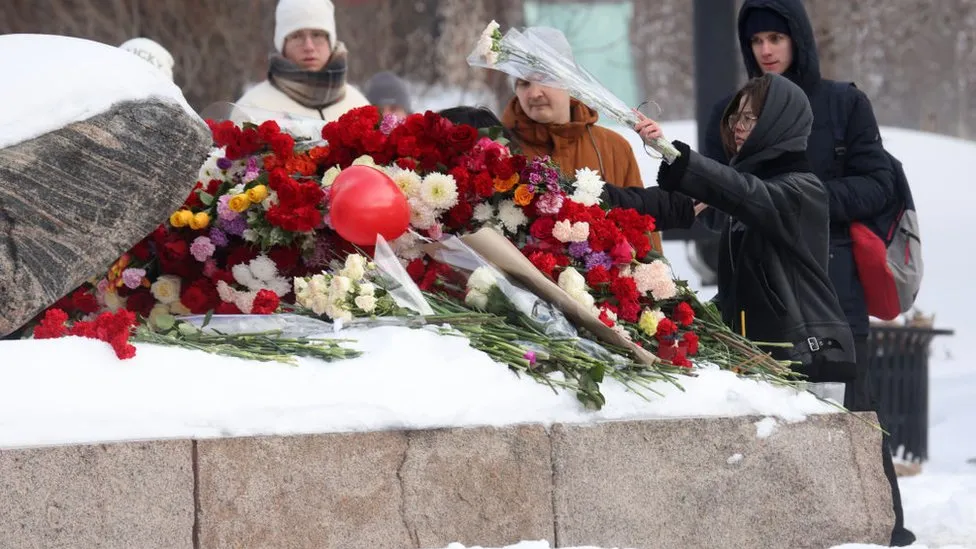Alexei Navalny: US and UK ambassadors to Russia lay tributes
The US and UK ambassadors to Moscow have laid flowers to honour Alexei Navalny, the Russian opposition leader who died in prison on Friday.

US ambassador Lynne Tracy and Britain's Nigel Casey were pictured paying their respects at a memorial in Moscow.
Navalny's allies believe he was murdered on the orders of President Vladimir Putin. Prison authorities say he suffered "sudden death syndrome".
About 400 Russians have been detained at gatherings for the campaigner.
Pictures showed a growing pile of flowers left for Navalny at the Solovetsky Stone - a monument to political repression that has become a major site of tributes for the 47-year-old.
"Today at the Solovetsky Stone we mourn the death of Alexei Navalny and other victims of political repression in Russia," the US embassy in Moscow said on social media.
"We extend our deepest condolences to Alexei Navalny's family, colleagues and supporters. His strength is an inspiring example. We honour his memory," the embassy's post added.
The UK embassy in Moscow's account on X, formerly known as Twitter, posted a photo of the British ambassador visiting the memorial on Saturday, and in an earlier post called for a "full and transparent investigation into Navalny's death."
They said the Foreign Office had summoned a representative of the Russian embassy, adding "we make it clear that we hold the Russian authorities fully responsible for Alexei's death."
Navalny's wife, Yulia, posted an Instagram on Sunday a photo of herself with her husband and the caption "I love you".
She had earlier called for the Russian president and his allies to be held accountable for her husband's death.
The EU's foreign policy chief, Josep Borrell, confirmed on X that he would welcome Ms Navalnaya at the bloc's Foreign Affairs Council on Monday.
He said that EU ministers would honour Navalny's memory and "send a strong message of support to freedom fighters in Russia".
As tributes pour in for the Kremlin critic, questions remain over the whereabouts of Navalny's body, with allies accusing the Russian authorities of hiding his body.
Russian prison authorities said on Friday that the opposition activist had become unwell following a walk and had lost consciousness at the remote IK-3 prison in the Arctic Circle - also known as the Siberian "Polar Wolf" penal colony.
Navalny allies said the politician's mother, Lyudmila Navalnaya, was told his body would only be handed over once a post-mortem examination had been completed, and that the cause of death was said to be "sudden death syndrome" - a generic, vague term for a condition which could cover a cardiac arrest with no apparent cause.
Navalny's allies said that Ms Navalnaya was told his body had been taken to the town of Salekhard, near the prison complex, but when she arrived the morgue was closed.
Prison officials reportedly told her an initial post-mortem examination was inconclusive and a second would have to be carried out.
The Russian president has not publicly commented on Navalny's death, but in the immediate aftermath, the Kremlin said it was aware and the president had been informed.
Russia's Foreign Ministry said it rejected "biased and unrealistic" assessments over his cause of death made during a meeting with British officials on Saturday.
-bbc







